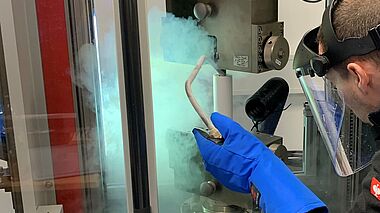
University of the Bundeswehr Munich: CFRP Testing Under Cryogenic Temperatures
Case Study
- Customer: University of the Bundeswehr Munich
- Location: Taufkirchen, Germany
- Industry: Academia
- Topic: Determination of material properties on CFRP specimens at room temperature and cryogenic temperatures
University of the Bundeswehr Munich
From civil engineering and environmental sciences to electrical engineering and information technology, business administration and mechanical engineering—the University of the Bundeswehr (Federal Armed Forces) Munich, founded in 1973, offers academic programs and 35 courses of study in a total of ten faculties, which are open to both civilian and military students. The goal is to offer them the best possible training and education in the shortest possible time.
The Faculty of Mechanical Engineering trains pilots for the German Armed Forces at the Institute of Aeronautical Engineering and conducts research in the field of aerospace engineering. The training center at the Ludwig Bölkow Campus in Taufkirchen has been in operation since 2015. In addition to basic and applied research, they also offer a dual Bachelor's degree course in Aeronautical Engineering, which is subject to continuous new developments. The teaching and research area covers all disciplines of aeronautical engineering, as well as thematically related fields. The institute has a total of five professorships, including the Professorship of Composite Materials and Engineering Mechanics.
The task
Component tests up to 100 kN and material characteristic value determination on CFRP specimens
Tobias Dickhut is Professor of Composite Materials and Engineering Mechanics at the Faculty of Mechanical Engineering at the University of the Bundeswehr Munich, where he conducts research in the field of fiber-reinforced plastic composites. In our new laboratory with the latest manufacturing options for aerospace structures made of fiber-reinforced plastic composites, I am concentrating specifically on issues relating to lightweight force transmission in highly stressed structural components made of composite materials and the use of the material at cryogenic temperatures, explains the scientist.
Dickhut and his team carry out material characteristic value determinations on carbon fiber reinforced plastic (CFRP) specimens at room temperature and at cryogenic temperatures. Cryogenic conditions are also referred to in connection with low temperatures. Without the use of the ZwickRoell Z100 AllroundLine universal testing machine, which was procured with funding from the Federal Ministry for Economic Affairs and Climate Action under grant number 50RK2142, it would not have been possible to determine mechanical parameters. Components made of fiber-reinforced plastic composites could not be designed to withstand loads. In the future, Dickhut also plans to use these characteristic value determinations for simplified component tests up to 100 kN.
The ZwickRoell solution
Z100 universal testing machine is ready to support future tasks
The ZwickRoell Z100 AllroundLine testing machine is currently being used to perform tests to determine the material properties of CFRP flat specimens at room temperature. The scope of testing possibilities can be expanded to cryogenic temperatures of 77K (-196 °C) and tests on tubular specimens. It is also intended to investigate the diffusion of gaseous media through the test specimen during tensile tests. This should also be done under cryogenic conditions. Dickhut plans to combine the tests: the tensile test, partly under cryogenic conditions, with the diffusion test.
“In the past, I’ve had frequent opportunities to work with ZwickRoell machines.I’m happy to now be able to incorporate this positive experience into our research projects at the University of the Bundeswehr Munich. My team and I look forward to our collaboration with ZwickRoell.”
Prof. Tobias Dickhut, PhD, Composite Materials and Engineering Mechanics at the Faculty of Mechanical Engineering
The result
Flexible material characterization and simplified component tests
The Z100 AllroundLine universal testing machine allows for flexible material characterization and simplified component tests to be carried out in the laboratory of the Chair of Composite Materials and Engineering Mechanics in order to support the development and research of new construction methods. With regard to further research projects, Dickhut is looking positively to the future, in which ZwickRoell testing machines will play a major role.
The testing machine can now be used to determine these characteristic values. In addition, video extensometers support the detailed design of highly stressed CFRP components and help to optimize their performance. In the future, additional sensor connections (strain gauge clip-on extensometers) will be used.